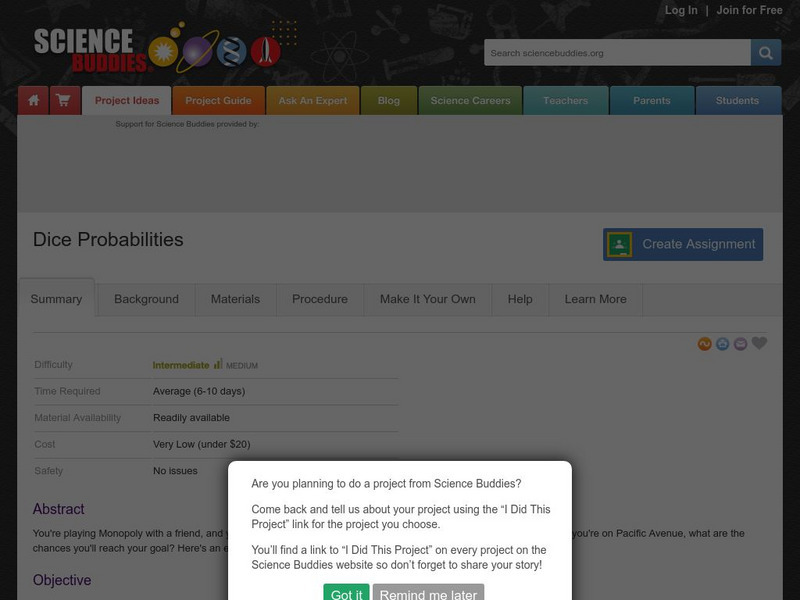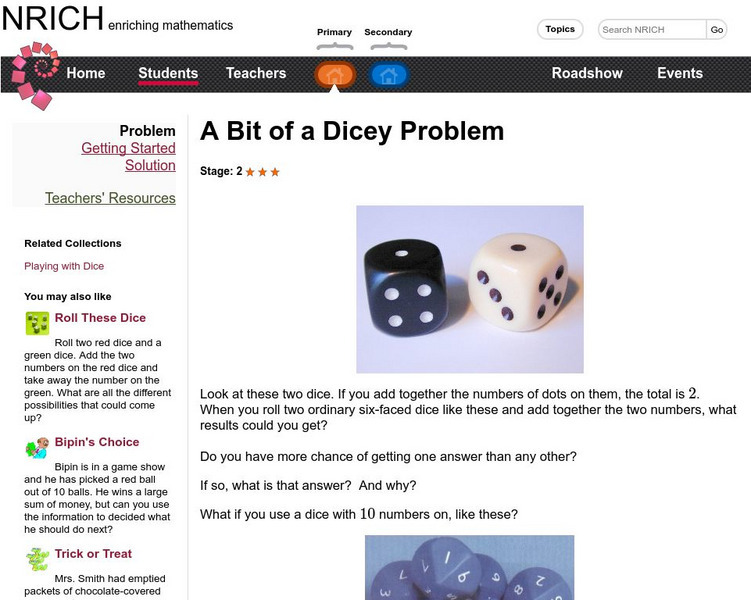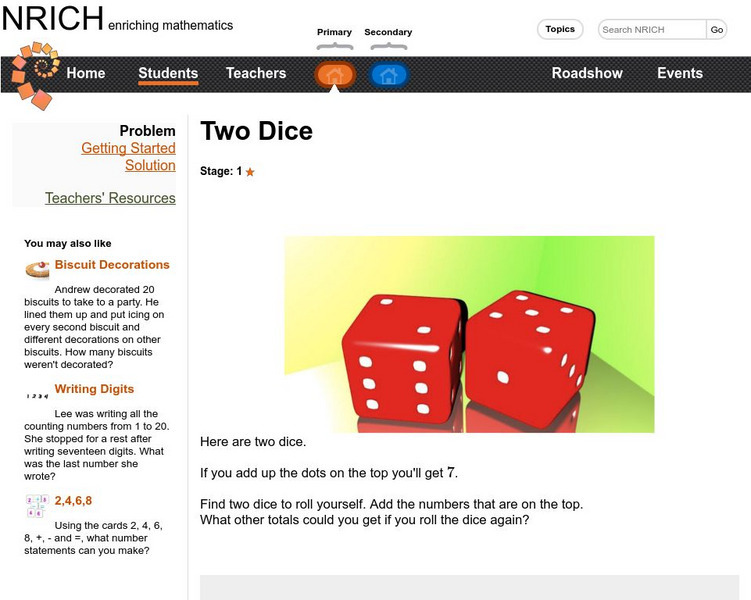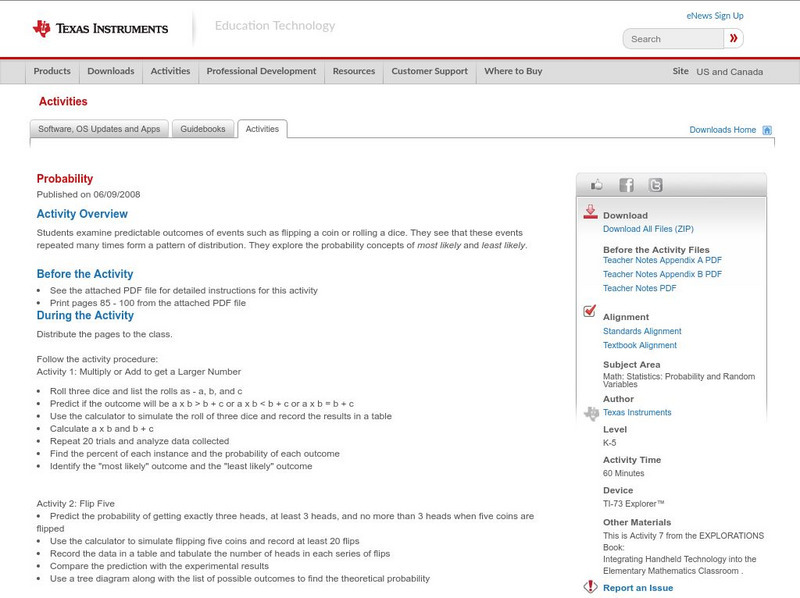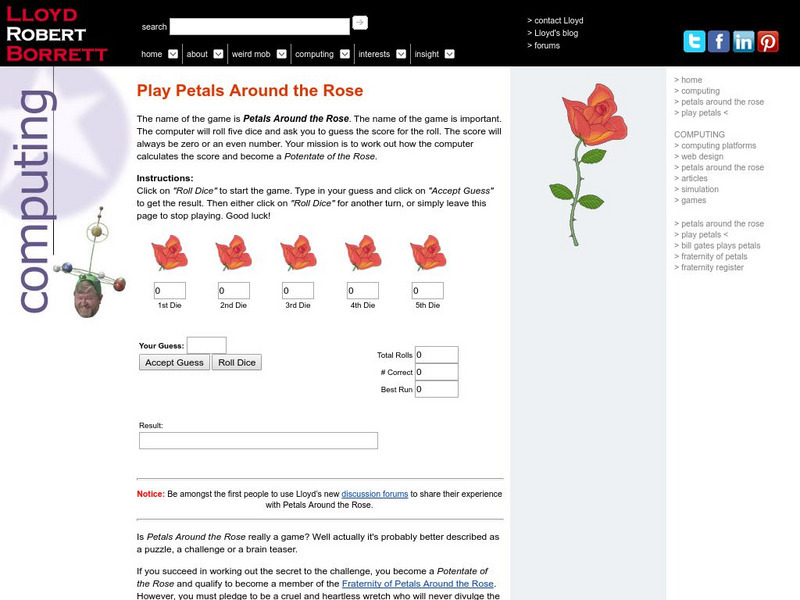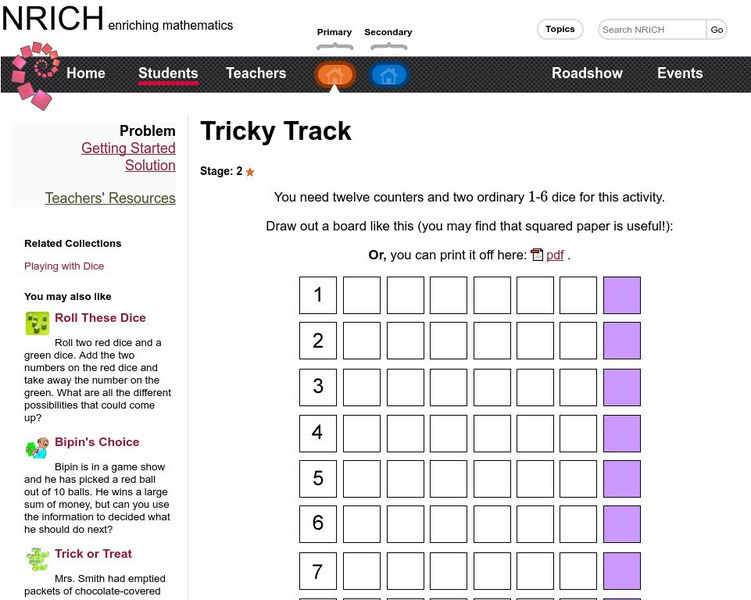Math Is Fun
Math Is Fun: Activity: An Experiment With a Die
Explore probability with this dice experiment. Includes instructions for recording data on a table, creating a graph, questions to investigate, a probability formula, and a discussion of probability.
Science Buddies
Science Buddies: Dice Probabilities
You're playing Monopoly with a friend, and you've already got Park Place and you really, really want to get Boardwalk. If you're on Pacific Avenue, what are the chances you'll reach your goal? Here's an easy project that will show you...
University of Cambridge
University of Cambridge: Nrich: A Bit of a Dicey Problem
Short website offers a look into the theoretical probability of tossing dice. Several questions related to the throwing of dice are included.
ClassFlow
Class Flow: Building Blocks for Addition
[Free Registration/Login Required] This flipchart reviews what addition is and what the equal sign does. It contains a section for writing math sentences using the dice generator. Then it has an Activote of 10 addition sentences.
ClassFlow
Class Flow: Penny and Dice Game
[Free Registration/Login Required] This flipchart is a game using the dice tool and pennies to practice addition and counting. Students start out playing with one partner and one die. Later you can increase the partners up to four. This...
ClassFlow
Class Flow: Multiplication by the Roll of the Dice
[Free Registration/Login Required] This flipchart is an interactive multiplication activity. Students create their own multiplication problems by rolling the dice. Each page has a different level of multiplication problem. Works great as...
University of Cambridge
University of Cambridge: Nrich: Two Dice
Use your problem solving skills to work on this problem that has to do with dice. The solution is right on this one page website.
Texas Instruments
Texas Instruments: Probability
Students examine predictable outcomes of events such as flipping a coin or rolling a dice. They see that these events repeated many times form a pattern of distribution. They explore the probability concepts of most likely and least likely.
TED Talks
Ted: Ted Ed: The Last Banana: A Thought Experiment in Probability
Imagine a game played with two players and two dice: if the biggest number rolled is one, two, three, or four, player 1 wins. If the biggest number rolled is five or six, player 2 wins. Who has the best probability of winning the game?...
National Council of Teachers of Mathematics
Nctm: Figure This: Are Dice Fair or Not?
Is it fair or not fair? That is the question. Try this math challenge where you use your probability and number sense skills to determine whether or not a game is fair. Find out how mastering this challenge can be useful in real life...
US Department of Education
Nces: Kids' Zone: Chances
Dice game allows you to see how increasing or decreasing the number of dice rolls affects an outcome.
Math Is Fun
Math Is Fun: Yacht (Dice Game)
A fun addition game, similar to Yahtze, with a simple goal: "try to score the highest amount you can".
ClassFlow
Class Flow: Probability Dice
[Free Registration/Login Required] The teacher will use this lesson plan flipchart to review probability.
ClassFlow
Class Flow: Game Dice
[Free Registration/Login Required] The teacher will use this lesson plan flipchart to review multiplication facts.
Other
Petals Around the Rose
Logic puzzle involving dice. A person must figure out a number based on which dice are rolled.
California State University
Cal State San Bernardino: Intro to Probability Models
The concept of random variables comes to life with this Applet used to roll one, two, six, or nine dice. The user selects the number of rolls to be completed, and the program quickly counts and graphs the results.
California State University
Cal State San Bernardino: Central Limit Theorem Applet
In this applet, rolling of dice is studied. The number that lands face "up" on the die is graphed as the die is rolled repeatedly. The user begins to see, with increased accuracy, the standard normal curve appearing as the graph.
Smithsonian Institution
Smithsonian American Art Museum: John Baldessari
As part of the Smithsonian Art Museum's database of artists, this site provides brief biographical information on John Baldessari in addition to a link to view "Black Dice," a work of Baldessari's at the museum.
ClassFlow
Class Flow: Fun With Probability
[Free Registration/Login Required] This flipchart focuses on 8th grade Probability. Through the use of interactive dice roller, magic viewer, and manipulation of objects, students can bring Probability to life!
University of Cambridge
University of Cambridge: Nrich: Tricky Track Game
The directions on this site are for an interesting, two-player dice game named Tricky Track. Grab a partner and play. Do your results surprise you?
Curated OER
Web Gallery of Art: Soldiers Gambling With Dice
An image of "Soldiers Gambling with Dice", created by Pieter Jansz Quast in 1643 (Oil on panel, 36 x 47 cm).
Curated OER
Web Gallery of Art: Soldiers Playing Cards and Dice (The Cheats)
An image of "Soldiers Playing Cards and Dice (The Cheats)", created by Valentin De Boulogne from 1618-20 (Oil on canvas, 121 x 152 cm).
Curated OER
Web Gallery of Art: Soldiers Playing Dice
An image of "Soldiers Playing Dice", created by Michelangelo Cerquozzi during the 1630's (Oil on canvas, 51 x 41 cm).
Curated OER
Web Gallery of Art: Two Boys Playing Dice
An image of "Two Boys Playing Dice", created by Bartolome Esteban Murillo from 1670-75 (Oil on canvas, 148 x 114 cm).
Other popular searches
- Probability Games With Dice
- Dice and Probability
- Probability Dice
- Probablity and Dice
- Math Dice Review Game
- Dice Games
- Sample Space 3 Dice
- Multiplication Using Dice
- Dice Lesson Plans
- Math Software Dice
- Sample Space 2 Dice
- Large Foam Dice



